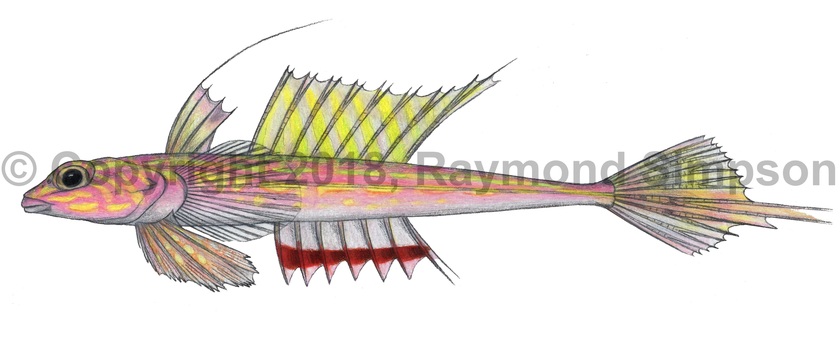
Common Name
Palefin Dragonet
Year Described
Nakabo & Hartel, 1999
Identification
Dorsal Fin: IV; 8
Anal Fin: 7
Pectoral Fin: 19 (2 simple)
Pelvic: I, 5
Caudal Fin: 7 branched + 1 upper and 2 lower simple rays
Vertebrae: 714
Body elongate and depressed, especially on the head. Pre-dorsal length 22-32% SP. Body tapering to tail. Eye quite large, close together, and dorsally placed. Mouth protrusible, small (just short of anterior orbit) and subterminal. Teeth only in jaws and not palatine or vomer. Head length a quarter of standard length. Gill opening small and oval. Preopercular spine with two strong spines at tip but none at base. Two dorsal fins: one spiny and one soft. First spine of D1 greatly elongated in both sexes (longer than rest of fin). D2 about as high as non-filamentous part of D1 and slightly concave. D2 consists of branched rays. Anal fin about as long as D2 with strong notches in the membrane margin. Anal fin consists of simple rays except for the final one which is branched. Pectoral fin large and fanlike. Pelvic fin expanded and broad with only a tiny membrane connecting it to pectoral fin base. Caudal fin in males with middle 2-3 rays greatly lengthened (females not modified but with a pronounced lower lobe). Lateral line single. Scaleless.
Color
Body pale reddish grading to white on the belly. Several scrawled yellow stripes on body and yellow spots/speckles on the dorsum and head. Dorsal fin pale with yellow spots and/or bands. First dorsal fin without a black spot between the last two spines in adults (present in juveniles). Caudal fin pale with yellow spots and a reddish streak along axis of longest rays. Pelvic fin reddish with yellow spots. Anal fin with a broad red band on the anal fin in males and black in females.
Size
Maximum size to 300mm. Collected material range from 52-201mm SL.
Habitat
Found on outer continental shelves and slopes, usually over 50m to around 300m. This species is more common at depths <200m. Maximum depth to 396m. Found over fine grained sediments resting on the bottom.
Range
Widespread from off northern New England to southern Florida, and the Gulf of Mexico west to the Mexican border.
References
Bemis, K.E., Marcy-Quay, B., Galbraith, J.K., Wuenschel, M.J., Sullivan, P.J., & W.E. Bemis. 2018. Deep-Water Dragonets (Teleostei: Callionymidae: Foetorepus) of the Mid Atlantic Bight: A Little-Known Genus from the Edge of the Continental Shelf. Copeia, 106(1), 188-198.
Nakabo, T., & K.E. Hartel. 1999. Foetorepus goodenbeani: a new species of dragonet (Teleostei: Callionymidae) from the western North Atlantic Ocean. Copeia, 114-121.
Other Notes
Sympatric with Foetorepus agassizii but can be distinguished by presence or absence of dorsal filaments (especially in males), caudal filaments (males) and details of fin and body coloration (i.e. dorsal fin ocelli).